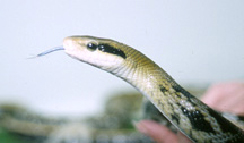Feeding Live Mice to Snakes Iacuc Protocol
What do snakes eat?
All snakes are carnivores. Their diet depends on the species. Some eat warm-blooded prey (e.g., rodents, rabbits, birds), while others eat insects, amphibians (frogs or toads), eggs, other reptiles, fish, earthworms, or slugs. Snakes swallow their food whole. The most popular pet snakes usually eat prey such as mice, rats, gerbils, and hamsters. Larger pet snakes also eat whole rabbits.
"All snakes are carnivores."

"Live prey should not be fed to snakes."
Live prey should not be fed to snakes, as the prey will not only suffer psychological stress while being hunted by the snake, but also threaten to harm the snake by biting it before they are eaten. Even a small mouse can bite and severely injure a pet snake by inducing a severe potentially life-threatening infection from the bite.
Snakes should be trained to eat dead prey. It is more humane for the prey and safer for the snake. Snakes can be offered either thawed, previously frozen prey, or freshly killed ones. You do not have to kill the prey yourself, as most pet stores will supply freshly killed or frozen rodents to feed.
How often should I feed my snake?
That all depends on your snake's age, size, and activity level. Smaller or younger snakes usually eat twice each week, while larger, more mature snakes typically eat once every week or two. Female snakes approaching breeding season can be fed more frequently. Your veterinarian can give you more specific advice about feeding based on your snake's individual requirements. Your pet will let you know how often he needs to eat by his response to your offering food. If he eats, he was hungry and needed to be fed. If he does not eat it immediately, he is not hungry and likely did not need to be fed yet.
My snake won't eat! What's wrong?
There are many causes for a pet snake not wanting to eat, from benign causes such as the stress of being in a new or disrupted environment, noise, lack of privacy, improper environmental temperature, hibernation, shedding, pregnancy, or breeding season anorexia, to more serious causes, including cancer, kidney failure, parasites, or other health issues. Your veterinarian can help determine the cause of your snake's decreased appetite by performing a thorough physical examination and appropriate laboratory testing.
Do I need to give my snake vitamins?
As a rule, no. However, since your snake 'is what he eats,' it is important to make sure that your snake's prey is healthy and well fed. For this reason, some snake owners, especially collectors, raise their own rodents for feeding to their snakes.
What about water?
A large, heavy ceramic crock or bowl (that cannot be spilled easily) filled with fresh clean water should be provided at all times. A good-sized dish may help maintain appropriate levels of humidity in the tank that are critical to keeping the snake hydrated and to helping it shed properly. Some snakes enjoy soaking in their water dish periodically, too, so the dish should be large enough to allow that. Many snakes will eliminate in their water bowl as well as drink from it, therefore, change the water frequently, and wash, disinfect, and rinse the bowl every day.
Source: https://vcahospitals.com/know-your-pet/snakes-feeding
0 Response to "Feeding Live Mice to Snakes Iacuc Protocol"
Postar um comentário